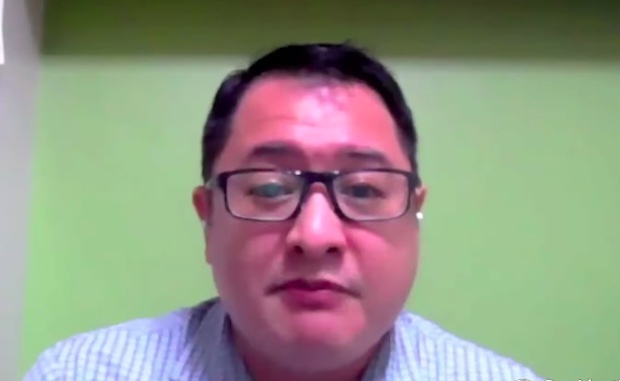
Dr. Edsel Maurice Salvana is the director of the Institute of Molecular Biology and Biotechnology at the National Institutes of Health at the University of the Philippines Manila. (Photo from an RTVM video)
MANILA, Philippines — There is yet a “surge “of COVID-19 cases in Metro Manila, declared an infectious disease expert working with the government on Wednesday, allaying fears and debunking statements from certain groups.
Dr. Edsel Salvana, a member of the Department of Health-Technical Advisory Group (DOH-TAG), told a House inquiry on the government’s COVID-19 pandemic response that the word “surge” is not the same as “increase” in infections.
According to him, the word surge is used to describe the point when the healthcare system is overwhelmed.
“‘Yong surge po kasi (The word ‘surge’) — I even asked Dr. John Wong, we talked amongst ourselves and we talked to formal epidemiologists po — surge is not a formal term that’s used in epidemiology,” Salvana said after a lawmaker asked the DOH to clarify the COVID-19 situation in Metro Manila.
“Kasi sasabihin na natin ‘increasing’ ‘yong cases, nakikita naman natin tumataas. Pero in the sense na ginagamit ang surge is when nao-overwhelm po ‘yong healthcare system kagaya ng nakita natin sa India. Dito naman sa NCR right now, our healthcare utilization is still about 50 to 54 percent, so hindi pa po siya overwhelmed,” he explained.
(Because we would say the cases are increasing as we have seen. But in the sense of using ‘surge’, it is when the healthcare system is getting overwhelmed, like what we’ve seen in India. Here in NCR right now, our healthcare utilization is still about 50 to 54 percent, so it is not yet overwhelmed.)
“We are seeing an increase in cases but there is no surge. There can be a surge downstream kaya nga ginagawa po natin itong preemptive lockdown (or else) pwedeng ma-overwhelm ang ating healthcare system,” he said.
(We are seeing an increase in cases but there is no surge. There can be a surge downstream but that’s why we are doing these preemptive lockdowns or else we may see our healthcare systems being overwhelmed.)
“Pero at this point po I do not think we can describe what’s going on in Manila as a surge. There is an increase in cases but our healthcare system can still cope, hindi pa tayo do’n sa — mas malapit pa nga sa surge ‘yong nangyari no’ng April po eh, where napuno po talaga ‘yong mga hospitals,” he continued.
(But at this point I do not think we can describe what’s going on in Manila as a surge. There is an increase in cases but our healthcare system can still cope, we’re not yet at that level — the situation we had last April, that’s even closer to a surge, where hospitals actually got overwhelmed.)
Before Salvana issued his comments, Nueva Ecija 1st District Rep. Estrellita Suansing, who presided over the hearing, mentioned OCTA Research’s outputs and projections on the country’s COVID-19 situation.
Last Sunday, OCTA Research said they are seeing a serious COVID-19 case surge in the National Capital Region (NCR) which may suggest that the COVID-19 Delta variant has been spreading in Metro Manila. The independent pandemic monitor also proposed that NCR undergo “circuit-breaking” lockdown to avoid extremely high cases due to the highly contagious coronavirus variant.
READ: OCTA notes NCR ‘serious surge’; hints Delta variant community transmission
READ: OCTA: PH needs ‘circuit-breaking’ lockdowns now amid Delta variant
It is unclear whether OCTA Research’s recommendations were used by the national government in deciding to revert NCR to a hard lockdown amid the COVID-19 Delta variant scare.
READ: Metro Manila under ECQ from August 6 to 20
But as early as July 26, the DOH already acknowledged the increase in cases within Metro Manila while asking the public to calm down as it was not a surge.
READ: Metro Manila, 5 other regions see rising COVID-19 cases
During Wednesday’s House hearing, Salvana said scientists try to refrain from using such “imprecise” language as it may lead to people panicking due to misinterpretations.
“And so we always refrain, especially among scientists, from using imprecise language, precisely because people misinterpret this and this causes what it means, pero nakakatakot sa tao kasi naririnig nila surge, eh syempre iniisip nila ‘yong India (but it’s scary for people once they hear ‘surge’ because, of course, they’ll be thinking of India). We’re not at that level,” he insisted.
Recently, OCTA Research has been the subject of scrutiny after some House lawmakers asked the Committee on good government to investigate its “qualifications, research methodologies, partnerships, and composition.”
The resolution was based on Salvana’s previous warnings that OCTA Research’s projections on COVID-19 growth are “problematic.”
READ: OCTA projection on COVID-19 problematic, using incomplete data, says medical expert